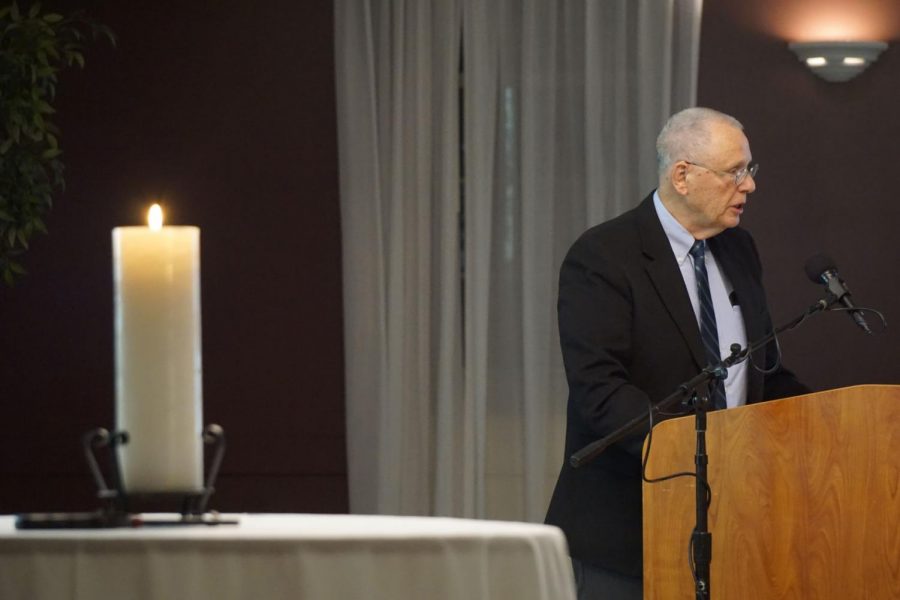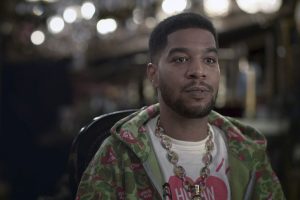Iona commemorates ‘the Night of Broken Glass’
November 14, 2018
Dr. John K. Roth of Claremont McKenna College gave a lecture at Iona’s annual commemoration ceremony for Kristallnacht, also known as “the Night of Broken Glass,” in the Thomas J. Burke Lounge on Nov. 12.
Kristallnacht, which occurred on Nov. 9 and 10, 1938, was a systematic violent attack against the Jewish people in Nazi Germany after a German-born Polish Jew assassinated a prominent Nazi German diplomat.
The Brother John G. Driscoll Professorship in Jewish-Catholic Studies coordinates the ceremony each year.
Dr. Elena G. Procario-Foley, associate professor of Religious Studies and director of the Brother John G. Driscoll Professorship in Jewish-Catholic Studies, spoke in an email interview about the ceremony.
“Kristallnacht is traditionally dubbed ‘the unofficial start of the Holocaust,’” Procario-Foley said. “It was an early warning sign of unbridled hate clothed in indiscriminate violence…Iona commemorates Kristallnacht because we need to find ways to prevent genocide.”
Procario-Foley offered a welcome address that reflected on the importance of commemorating Kristallnacht in light of the recent attack on the congregation at the Tree of Life Synagogue in Pittsburgh.
A candle was lit as a memorial to the Jews killed on Kristallnacht. After a moment of silence, a prayer originally offered for the Tree of Life Synagogue was recited by those in attendance.
Roth, an Edward J. Sexton professor Emeritus of Philosophy founding director, gave a lecture after the commemoration entitled “We Are in This World to Do Good: Ethics During and After the Holocaust.”
Roth’s lecture began with a brief history of the events in Nazi Germany that led up to Kristallnacht as well as photographs showing the destruction of property that occurred that night.
“Hundreds of Jewish synagogues were torched while fire brigades stood by,” Roth said. “Some 7,500 Jewish businesses were looted without intervention by the police. Jewish cemeteries were desecrated. At least 91 Jews were killed and about 30,000 Jewish men arrested and sent to the newly enlarged concentration camps.”
Roth then spoke about the role that ethics plays when thinking about the Holocaust. Roth highlighted the works of prominent Holocaust survivors such as Primo Levi, author of “Moments of Reprieve,” and Elie Wiesel, author of “Night.”
In “Moments of Reprieve,” Levi remembers his friend Lorenzo Perrone, an Italian civilian who Levi attributes to saving his life during his time in a concentration camp. In “Night,” Wiesel recalls the hysterical crying of Mrs. Schächter, a woman who was in the same train car with Wiesel’s family while they were being transported to Auschwitz.
After the lecture, the floor was opened for a question and answer session between Roth and the attendants.
Sophomore Willow Lopez-Silvers attended the event after enjoying similarly themed events that Iona has held in the past.
“It really kind of just shows the importance of education and continuing to learn about these issues even eighty-plus years later,” Lopez-Silvers said.
According to Procario-Foley, Roth taught a class for the core curriculum learning community entitled “Just Is: Reflections on Justice, Truth, and Earth” on the morning of Nov. 12. Procario-Foley said that over 200 Iona students were in attendance.








